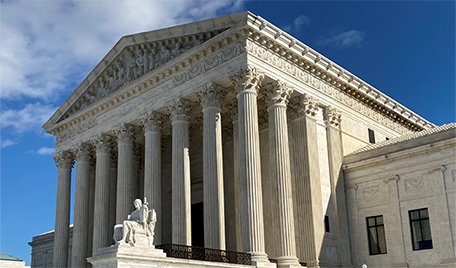On Thursday, the Supreme Court ruled against a group of medical associations and doctors who opposed the use of mifepristone, a drug that is used to end pregnancies.
 Writing for the Court in Food and Drug Administration v. Alliance for Hippocratic Medicine, Justice Brett Kavanaugh said the plaintiffs lacked Article III standing to challenge the Food and Drug Administration’s regulation of the abortion medication.
Writing for the Court in Food and Drug Administration v. Alliance for Hippocratic Medicine, Justice Brett Kavanaugh said the plaintiffs lacked Article III standing to challenge the Food and Drug Administration’s regulation of the abortion medication.
The plaintiffs had sought to either make mifepristone unavailable in the marketplace, or rescind FDA decisions in 2016 to extend its use for pregnancies up to 10 weeks, and allow healthcare providers and practitioners to prescribe the drug. An FDA decision in 2021 to waive as initial in-person visit requirement.
“Several pro-life doctors and associations sued FDA, arguing that FDA’s actions violated the Administrative Procedure Act. But the plaintiffs do not prescribe or use mifepristone. And FDA is not requiring them to do or refrain from doing anything,” Kavanaugh said. “Under Article III of the Constitution, a plaintiff ’s desire to make a drug less available for others does not establish standing to sue. Nor do the plaintiffs’ other standing theories suffice. Therefore, the plaintiffs lack standing to challenge FDA’s actions.”
The Fifth Circuit Court of Appeals had decided that the Alliance for Hippocratic Medicine had standing to sue the FDA, and that the Alliance was likely to succeed on its challenges to FDA’s ruling on the use of the drug for up to 10 weeks and its wider availability.
The Alliance argued that the FDA’s regulation of mifepristone may cause downstream conscience and economic injuries to the individual doctors, and that medical associations had organizational standing to sue under court precedents. The Supreme Court only decided the issue of standing in its decision.
“The plaintiffs have sincere legal, moral, ideological, and policy objections to elective abortion and to FDA’s relaxed regulation of mifepristone. But under Article III of the Constitution, those kinds of objections alone do not establish a justiciable case or controversy in federal court,” Kavanaugh concluded. “The plaintiffs may present their concerns and objections to the President and FDA in the regulatory process, or to Congress and the President in the legislative process. And they may also express their views about abortion and mifepristone to fellow citizens, including in the political and electoral processes.”
Justice Clarence Thomas concurred in the unanimous decision. “The Court aptly explains why plaintiffs have failed to establish that the Food and Drug Administration’s changes to the regulation of mifepristone injured them,” Thomas wrote. “As I have previously explained, a plaintiff cannot establish an Article III case or controversy by asserting another person’s rights.”
The Alliance for Hippocratic Medicine decision is one of two cases related to abortion to be settled at the Supreme Court this month.
In Moyle v. United States (consolidated with Idaho v. United States), the Court is considering how to interpret and rule on two seemingly conflicting laws: An Idaho law that bars abortions unless a physician “acts within exceptions that the statute enumerates,” and a federal law that requires facilities receiving Medicare funds to offer medically necessary care that may result in the termination of the pregnancy.
The Supreme Court usually concludes the release of decisions in its current term by the end of June.
Scott Bomboy is the editor in chief of the National Constitution Center.







